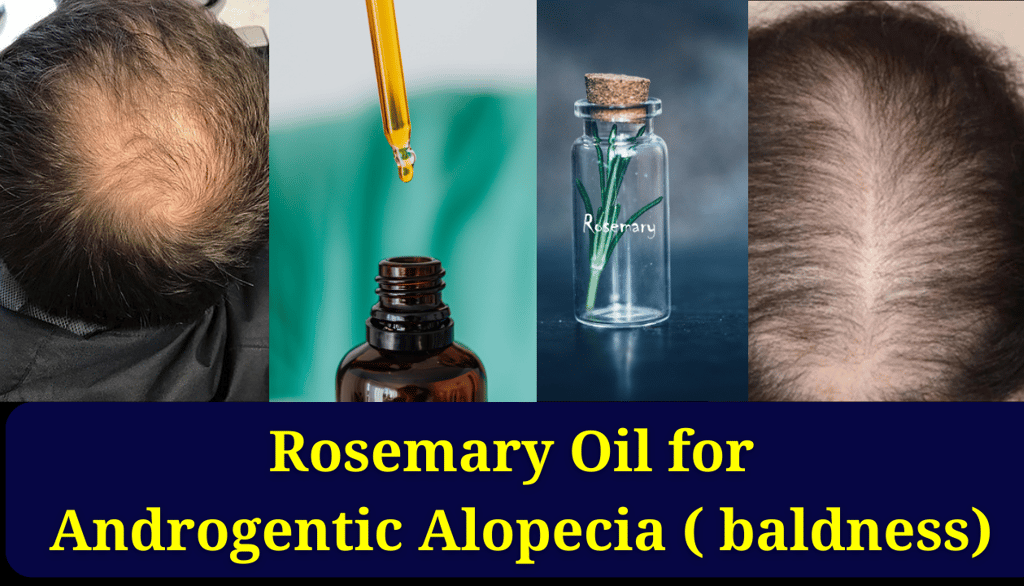Can Rosemary Oil treat Baldness ( Androgenetic Alopecia)
Androgenetic alopecia is a hereditary condition characterized by progressive hair thinning and eventual baldness, often attributed to the influence of hormones on hair follicles. Both men and women can be affected by this condition, leading to a search for effective treatments that address the root causesThis article delves into the fascinating world of rosemary oil's role in treating androgenetic alopecia, supported by scientific evidence that sheds light on its effectiveness.
Dr.Sujith Karimbil
8/23/20233 min read


Harnessing Nature's Gift: Rosemary Oil in the Treatment of Androgenetic Alopecia
Androgenetic alopecia, commonly known as male or female pattern baldness, is a condition that affects millions worldwide. While there are various treatment options available, the search for natural remedies has led to the exploration of rosemary oil as a potential solution. This article delves into the fascinating world of rosemary oil's role in treating androgenetic alopecia, supported by scientific evidence that sheds light on its effectiveness.
Understanding Androgenetic Alopecia and Its Challenges:
Androgenetic alopecia is a hereditary condition characterized by progressive hair thinning and eventual baldness, often attributed to the influence of hormones on hair follicles. Both men and women can be affected by this condition, leading to a search for effective treatments that address the root causes.
Rosemary Oil: An Ancient Remedy with Modern Interest:
Rosemary (Rosmarinus officinalis) is an aromatic herb that has been used for centuries for its potential health benefits. In recent times, rosemary oil has garnered attention for its potential to combat hair loss, specifically androgenetic alopecia. This interest has prompted scientific investigations to validate its efficacy.
Scientific Evidence Supporting Rosemary Oil's Hair Benefits:
Hair Growth Promotion: A study published in the "Phytotherapy Research" journal in 2015 evaluated the effects of rosemary oil on patients with androgenetic alopecia. The study concluded that the group using rosemary oil experienced significant improvements in hair growth parameters compared to the control group.
Comparable to Minoxidil: In a study published in the "Skinmed" journal in 2015, researchers compared the effects of rosemary oil and minoxidil (a commonly used topical treatment for hair loss). The study found that both rosemary oil and minoxidil were effective in promoting hair growth, with the rosemary oil group showing slightly less hair growth but also experiencing fewer side effects.
DHT Inhibition: A significant factor in androgenetic alopecia is dihydrotestosterone (DHT), a hormone that contributes to hair follicle miniaturization. A study published in the "Journal of Biomedical Science" in 2013 investigated the effects of rosemary oil on DHT-induced hair loss in mice. The study revealed that rosemary oil effectively reduced the DHT-induced disruption of hair follicles.
Mechanisms of Action: How Rosemary Oil Works:
Rosemary oil's potential in treating androgenetic alopecia is attributed to its multifaceted mechanisms of action:
DHT Reduction: Some studies suggest that rosemary oil inhibits the enzyme responsible for converting testosterone into DHT, thereby reducing DHT levels in the scalp and minimizing miniaturisation of hair follicles.
Improved Microcirculation: Rosemary oil has vasodilatory effects, which means it can enhance blood circulation to the scalp. Improved microcirculation ensures that hair follicles receive the nutrients they need for optimal growth.Minoxidil is used beacause of this property of vasodilation
Anti-Inflammatory Properties: Inflammation can contribute to hair follicle damage. Rosemary oil's anti-inflammatory properties help create a healthier environment for hair growth.
Incorporating Rosemary Oil into Your Routine:
While the research on rosemary oil's potential in treating androgenetic alopecia is promising, it's essential to use it with care. Here's how you can incorporate it into your routine:
Dilution: Always dilute rosemary oil with a carrier oil, such as coconut oil or jojoba oil, before applying it to your scalp.
Patch Test: Perform a patch test to ensure you don't have any adverse reactions to the oil.
Consistency: Consistent application is key. Apply the diluted rosemary oil to your scalp and gently massage it in, ideally leaving it on for a few hours before washing.
Consultation: If you're currently undergoing medical treatments or have underlying health conditions, consult a healthcare professional before adding rosemary oil to your routine.
Nature's Promise for Fuller Hair:
The use of rosemary oil as a potential treatment for androgenetic alopecia holds great promise. Scientific studies support its effectiveness in promoting hair growth and reducing the impact of factors like DHT. While it's not a guaranteed solution, the natural properties of rosemary oil make it an intriguing option for individuals seeking natural alternatives in their battle against hair loss. As with any treatment, it's crucial to approach it with informed caution, incorporating it into a comprehensive hair care regimen for the best possible results.
To know more skin and hair facts like this, consider subscribing to skindoctorchannel for videos both in English and Malayalam
Sources:
PubMed: "Rosemary oil vs minoxidil 2% for the treatment of androgenetic alopecia: a randomized comparative trial."
Insider: "Rosemary oil may help you grow long and luscious hair — here's the science behind it."
Cleveland Clinic: "Growth Market: How Rosemary Oil Can Help Your Hair."
